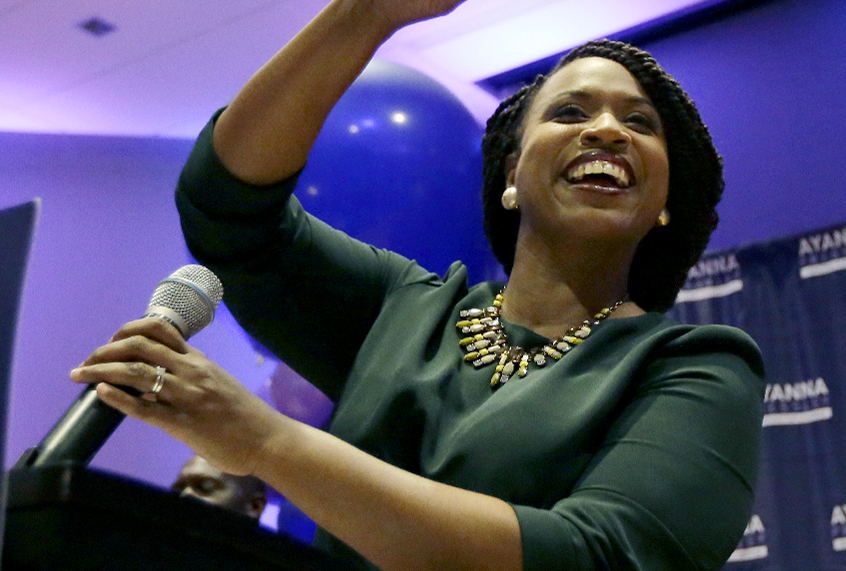Boston City Council member Ayanna Pressley defeated 10-term incumbent Rep. Michael Capuano on Tuesday in the Democratic primary for Massachusetts’ 7th congressional district — another startling upset for the Democratic Party’s insurgent progressive wing. Pressley’s victory builds on the outsider enthusiasm ignited by first-time candidate Alexandria Ocasio-Cortez, who defeated another 10-term Democratic congressman in a New York primary earlier this summer.
Capuano, who is viewed as a reliable liberal vote in Congress and represents one of the safest Democratic seats in the nation, had not faced a primary challenge since he was first elected in 1998.
Capuano conceded to Pressley on Tuesday evening. “Clearly the district wanted a lot of change,” he told supporters after his loss. “I’m sorry that this didn’t work out.”
With no Republican rival on November’s ballot for the district, which includes most of Boston and much of Cambridge and was once represented by John F. Kennedy, the Chicago-raised Pressley is poised to make history as the first black congresswoman from Massachusetts. The 44-year-old candidate has already broken through barriers in Boston politics. In 2009, she became the first woman of color ever elected to the Boston City Council.
Pressley argued that she was more receptive to the needs of the state’s only congressional district with a majority nonwhite population, who needed a fresh voice in Washington.
During a contentious, up-and-down campaign race — a poll for radio station WBUR showed Capuano leading Pressley by 13 points a month ago, while an Emerson College poll in July showed Capuano with a nine-point lead — Pressley focused on the district’s need for a newer, more progressive Democratic representative.
“I’ve been told to wait my turn,” Pressley said at a campaign event earlier this year. “I’ve been called a traitor for challenging an incumbent, told simply this isn’t the way things are done here.”
But she added, “When the challenges we are confronted with are this big, this deep, and growing, I can’t and I won’t wait my turn.”
The moment when @AyannaPressley learned she won. No commentary needed. 💜 #ChangeCantWait #mapoli #ma7 #electwomen #electionday pic.twitter.com/SLLlQTI1Sj
— Jesse Mermell (@jessemermell) September 5, 2018
Pressley’s supporters included Ocasio-Cortez, the political novice who rocketed into the national spotlight after she defeated Rep. Joe Crowley, the fourth-highest ranking member of the House Democratic caucus, who had also faced no primary opposition in more than a decade. Shortly after her own primary win in June, Ocasio-Cortez gave Pressley a ringing endorsement and implored Massachusetts voters to “Vote her in next.”
“The people closest to the pain should be closest to the power.”
– @AyannaPressley.Vote her in next, Massachusetts.
There are more of us, too: @CoriBush, @Chardo2018, @AyannaPressley & more.
We need to elect a corporate PAC-free caucus if we’re going to get things done. https://t.co/M2tF5cedTs
— Alexandria Ocasio-Cortez (@AOC) June 27, 2018
Pressley also sent campaign staffers to assist Ocasio-Cortez in her get-out-the-vote efforts, and was quick to congratulate the New Yorker on her primary victory.
“You proved that when we stand up for what we believe in, we win,” Pressley tweeted. “This is a movement. Together, we will change the world.”
As in Ocasio-Cortez’s race, Pressley is a progressive woman of color who challenging an incumbent white male lawmaker. Both House candidates support abolishing ICE, “Medicare for all” and higher education reform — Pressley is promoting debt-free college while Ocasio-Cortez supports tuition-free college.
READ MORE: The Year of the Woman in electoral politics? Maybe so — but not for Republicans
Like Ocasio-Cortez, Pressley didn’t accept donations from corporate political action committees (PACs) during her campaign. One significant difference was that while Ocasio-Cortez ran against a more moderate Democrat associated with the powerful Queens Democratic Party machine, Capuano is a member of the Congressional Progressive Caucus who is viewed positively by left-wing activists. Both Pressley and Capuano admitted that their voting records would be largely the same, and Pressley’s campaign focused less on highlighting policy differences than on cast herself as as the candidate of change in the district.
Capuano promoted his years-long support for Medicare for All, and positioned himself as staunchly anti-Trump. He refused to attend the president’s inauguration last year, has twice voted to impeach him and has frequently criticized him on Twitter.
Still, the Boston Globe, the region’s major newspaper, gave Pressley their endorsement, and Pressley effectively ran to Capuano’s left on several major issues, including ICE abolition and the restoration of voting rights to prisoners. (Capuano voted against the creation of ICE in 2002, but has since argued that the more important immigration reform was “to get rid of Donald Trump.”) Pressley also gained an advantage over Capuano when the congressman complained that the Democratic Party was being “balkanized” by racial identity issues, a remark seen as a damaging gaffe.
“This is not just a blue wave; this is a movement that’s coming to Congress,” Ocasio-Cortez said at a June appearance with Pressley, before either had won her race, the Washington Post reports.
“When we had the Women’s March, they thought that was a moment,” Pressley said at the event. “We had signs that said: ‘Today we march, tomorrow we run.’ And they didn’t believe it!”

